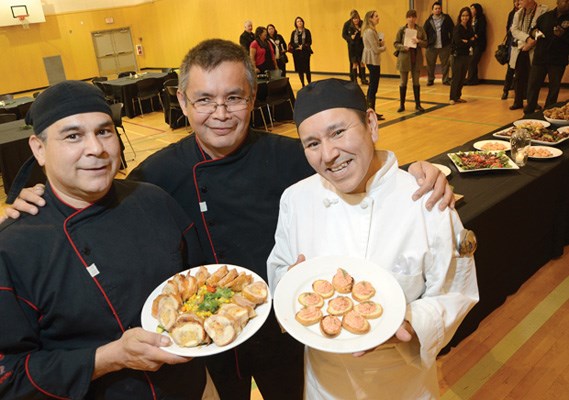ON Monday, while sheets of cold, grey rain fell outside, members of the Tsleil-Waututh Nation greeted guests to their community centre with a warm welcome.
It was a good day. The nation was celebrating the graduation of the first class to take part in a unique pilot project: Professional Cook Level 1 training, with an emphasis on Aboriginal foods and techniques.
Chef and lead instructor Andrew George said when he was in cooking school in the '80s there was only one other Aboriginal student in his class. In the years that followed - which included stints at the Château Whistler and the Four Seasons Hotel, participation in the Culinary Olympics in Frankfurt and the head chef role at the Four Host First Nations Pavilion during the Winter Olympics - he wondered, how do we get our people into this system?
George pointed out that with a shortfall of cooks expected in the next decade in this province, there will be many job opportunities. And cooking is a natural fit for First Nations people.
"We always welcome people to our land through food."
The Tsleil-Waututh launched the 28-week program in the spring. Twelve students received classroom training for the Professional Cook Level 1 as laid out by the Industry Training Authority. The course taught them about food preparation, food safety and menu development, and included a practicum in a local restaurant; but it also had a strong emphasis on Aboriginal cooking.
"A lot of our students . . . have a challenging life," councillor Carleen Thomas told the assembled guests. "The program is designed with Aboriginal students in mind." It's designed to help them succeed.
The nation invested in equipment for the program, and was assisted in funding and resources by Aboriginal Skills Group and First Nations Employment Society.
Funding is being sought for a second year of the Level 1 program as well as for a Professional Cook Level 2 course.
The lunch served by George and the students was a milestone in another way. It included Roosevelt elk, once common in Tsleil-Waututh territory but overhunted in the 1800s and currently a blue-listed species of concern. In 2006, the band and the provincial government collaborated to reintroduce the elk to the Indian River Valley. This year, the size of the herd allowed for a small harvest.
"It's been over a hundred years since any member of the Tsleil-Waututh could harvest wild game," said Thomas.
Roasted, the elk was loaded onto a platter along with ostrich
and a heap of seasonal vegetables. It also made it into a fusion dish: spicy lettuce wraps.
Venison was sliced thin and layered onto dense bannock with Saskatoon berry chutney, and rabbit was served two ways: seared, and oven roasted in a roulade. There was an airy salmon paté on toasted slices of baguette, and crisp curry fritters. Perhaps the most talk around the table was about the soapberries used for dessert, which contain natural, low-sudsing detergent that foams when whisked. They were mixed with sugar for a wild, still slightly bitter mousse.
It's food that's very healthy, said Thomas. "It's natural, has no preservatives and no additives." It fits in with the program's aim of developing leaders in the Aboriginal community against obesity and diabetes.
For more information about the Tsleil-Waututh Professional Cooks Program, visit twnation.ca.
. . .
Setting it Straight
In my Oct. 17 column, I said the former owner of the Marinaside Grill was still involved with the operation of the restaurant. In fact, he has not been associated with the restaurant for some time.
Deana Lancaster has been writing about food and wine for 12 years, and worked in restaurants for more than a decade before that. Follow her on twitter @deanal, or send an email to [email protected].



